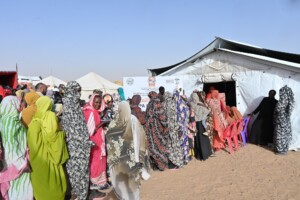‘Sudanese Pound rate will continue to drop’: economist
The Pound will continue to fall against the Dollar, causing the inflation to rise further, according to a prominent Sudanese economist. He warned for an increase of school drop outs and fractured families. The Central Bank of Sudan announced the development of a money transfer service by mobile telephone.
In an interview on Sunday, economist Dr Sidgi Kabello told Radio Dabanga that “The government is doing nothing to increase the supply of foreign currencies.
The Pound will continue to fall against the Dollar, causing the inflation to rise further, according to a prominent Sudanese economist. He warned for an increase of school drop outs and fractured families. The Central Bank of Sudan announced the development of a money transfer service by mobile telephone.
In an interview on Sunday, economist Dr Sidgi Kabello told Radio Dabanga that “The government is doing nothing to increase the supply of foreign currencies.
“The authorities as well did not attempt to reduce the demand for currencies. Goods that easily can be produced at home, such as vegetables and fruits, are now being imported from South Africa and Lebanon,” he added.
“The shortage of hard currencies will thus continue to drive up the price of the US Dollar on the black market, which in turn will cause the inflation to rise as well.”
In March, Kabello urged the government to reduce these “imports of unnecessary items”, in order to lower the foreign currency exchange rates. “This would have a positive impact on the prices of essential goods and production inputs.”
Political stability, production
“What the country needs, is political stability, as this is the key to attracting foreign investment that is so much needed for the supply of foreign currency,” Kabello said.
He cited in this regard Khartoum’s inability to form the new Government of National Accord for more than 45 days. “Moreover, the new government will not be able to do much, as the parties are divided beforehand.”
In this context, the economist referred to the recommendations of the National Dialogue, on which the coming government is based. “The National Dialogue outcomes will expand and slacken the state apparatus. So no matter how much tax money the authorities raise, they will have difficulty in providing the salaries to all the state apparatus branches”.
He further questioned the seriousness of the government concerning agricultural and industrial production. “The government now plans to plant 800,000 acres of cotton in a number of irrigated and rain fed areas. Most of the cotton however is genetically modified cotton from China and India instead of the original Akala and Shambat cotton that sells far much better at the world markets.”
He added that the preparations for the agricultural season “have not even started yet, while the agricultural season will start in mid June”.
Poverty
Kabello pointed to a recent research of the Central Trade Unions Bureau of the Sudanese Communist Party that stated that the minimum monthly wages in Sudan cover seven percent of the basic needs of an average family of five people.
“The continuing high inflation has many implications: Students drop out from school and search for work in the informal sector. More and more women will head the families, as the men are searching for work in other parts of the country or abroad.”
Mobile banking
Next month, the Sudanese will be able to use their mobile telephones for banking, the Central Bank of Sudan recently announced.
The Bank formed a committee with the National Telecommunications Corporation to develop the procedures. The daily amount that can be transferred will probably be set to a maximum of SDG 500 ($75) per subscriber.











 and then
and then